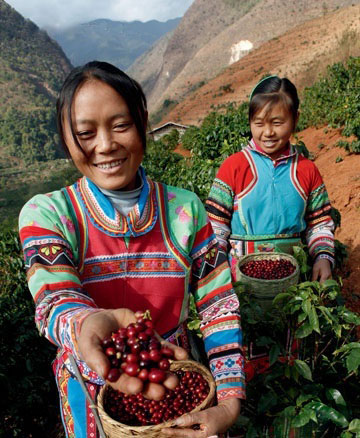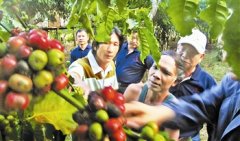Coffee Bean Workshop in Baoshan, Yunnan

In Baoshan City, Yunnan Province, people use the rainy season and the dry season to divide the climate change in the year.
It was a quiet and sunny afternoon, and the kapok tree arranged its branches and leaves in the warm spring breeze, and it would soon fill the courtyard with the fragrance of marshmallow. Tian Daihe decided whether to go to the kindergarten in Lujiang Town completely according to his own mood. This 3-year-old Japanese girl, who speaks Yunnan Mandarin, is always popular with farmers in the eight townships. During the last picking season of coffee beans, her parents Tian Daiju and Tian Daisi were the busiest. In this way, Tian Daihe has free space to haunt every corner of the manor.
Coffee beans are drying in the courtyard, and these white beans come from coffee plantations on the red hills of Gaoligong Mountain not far away. The life of the coffee farm is very different from that of the city. People work at sunrise and rest at sunset, which is typical of rural life. Mr. and Mrs. Tian and their daughter live in this land far away from the world, but their life is not boring. Every day is busy. In their view, growing and cultivating coffee organically is not only a complicated and long task, but also a dream to be realized. They want to grow the best organic coffee in the world on this land.
The memory of growth-- Tian Daisi
Tian Daisi had a busy day. She got up before dawn. After the sun came out, she was responsible for leading the farm staff to see if the coffee dried in the courtyard was over-hydrated after one night. After that, he will be responsible for working with the workers to select the progress of the peeled coffee beans and the fertilizer produced in the "coffee canteen".
Organic and environmental protection are bundled topics. Eight years ago, Daiji Ta, who received a degree from Japan Agricultural University, went to NGO in the Dominican Republic to organize her work. During her five years there, her main job was to promote organic agricultural production technology to local farmers and to use her agricultural knowledge to preserve local soil and water from the pollution of modern chemical industry. The work they did at that time is now being used in Dominica, India, Sri Lanka and other countries. It was at that time that she became acquainted with her lover, Tian Daishi. It was not until one day when they saw Qiu Yonghan, a Japanese overseas Chinese entrepreneur, recruiting technicians to go to Yunnan, China for organic coffee cultivation that they decided to leave Dominica.
In order to cultivate the best organic coffee, Mr. and Mrs. Tian Daisi went to the Blue Mountain Coffee planting Base in Jamaica to learn about organic coffee cultivation at their own expense before coming to Yunnan. She used an anthropomorphic metaphor to describe to me that at every stage of organic coffee from gestation to maturity, located in a corner of the courtyard is the coffee nursery. The selected strong coffee beans are sent to this special nursery for cultivation at the end of each year. The period of rooting and sprouting of coffee beans is very slow, and it takes a long time of two or three months from sowing to emergence. The germinated coffee seedlings are sent to a nearby coffee farm kindergarten for management, which is the most important stage, in order to prevent coffee seedlings from being burned by intense ultraviolet rays or wind and rain. Special materials should be used to shield them from safe and comfortable shelter. At this stage, the diet that coffee children need is also very critical, in addition to the organic food specially prepared by the farm, the corn straw responsible for blocking the sun and Rain Water (Rain Water flows through the straw when it rains will bring potassium-rich nutrients to the seedlings) is also the best source of nourishment. Almost a year later, the resistant coffee children will settle in the fertile red soil of the coffee farm and get careful care from the farmers. Today, the first coffee trees cultivated by Mr. and Mrs. Tian Daisi are three years old, the same age as their daughter Tian Daihe, and are beginning to bear beautiful fruit.
The memory of Life-- Tian Daishi
In the shade of the kapok trees in the courtyard, a table covered with Yunnan batik blue tablecloth is equipped with utensils for brewing and drinking coffee. The workers in the coffee farm sit here during the afternoon break to drink the fresh coffee produced that year, and the aroma is scattered in the sun. Tian Daizhu told me that in February, Panzhihua will be in full bloom, when the aroma of the flowers mingled with the beautiful taste of coffee.
It is six kilometers to the coffee farm, and Masuki commutes to and from the farm once or twice a day, where he is responsible for checking the quality of the picked coffee beans and the growth of the coffee trees. Coffee beans are picked between September and February of the following year, which is the busiest season for coffee farms. Because it is organic planting, coffee trees to ensure healthy growth, pests or diseases must be timely treatment and cleaning, during which the use of pesticides is not allowed, so we need to increase a lot of work to ensure that coffee trees are not troubled by diseases and insect pests.
Today, there are more than a dozen farmers working for the farm, some of whom live in small courtyards on the hillside of the farm, most of them Miao and Dai. Farmers here maintain the traditional customs of life, they wear national costumes embroidered with beautiful patterns to pick coffee, in a green coffee tree ridge is very easy to identify, like flowers blooming in the trees. They drink a kind of fragrant tea called tangerine grass grown under coffee trees, which has a natural citrus aroma. People living on both sides of Gaoligong Mountain have the custom of drinking this kind of herbal tea, which can not be seen in the market. Zhengshu also likes this kind of grass tea, and he sits in the yard with the farmers to drink it in the work break. He said that the plant's roots a few meters deep in the ground will bring a special ingredient to the soil, which is also the best vaccine against diseases for young coffee trees.
The farmers on the farm also raise chickens and pigs here. Tian Daihe likes to watch the piglets most, and every time he goes to the farm, he will quarrel to visit the piggy's house. Poultry and livestock manure is not directly used for fertiliser, but is collected and processed as a small part of the field couple's coffee tree diet, which also includes EM bacteria, coffee shells, coffee bran, withered oil (residue of rapeseed oil), charcoal residue, and so on. January and February is the best time to produce food for coffee trees of the year. Tian Daisi is the commander in charge of making coffee food. When her husband was making fertilizer, she drew the whole production process into a cartoon diagram to explain to me, and the originally boring biological knowledge suddenly became lively and easy to understand. Tian Daizhu said that this technology can not only be used in coffee cultivation, they are also using this way to enable local people to learn more techniques to promote the organic cultivation of crops.
Every day the farmers bring baskets of red fruit back to the courtyard. Tian Daihe likes to run in the coffee tree field where she is the same age, and the saplings are the same as her height. Tian Daisi told her that every small tree here is a child like you, and you should cherish your friends. The joy of the harvest season is intertwined with busyness, and the beautiful days are intertwined with the aroma of coffee.
Important Notice :
前街咖啡 FrontStreet Coffee has moved to new addredd:
FrontStreet Coffee Address: 315,Donghua East Road,GuangZhou
Tel:020 38364473
- Prev

Global coffee producing area-Guadeloupe
These islands in the Caribbean used to be an important producer of coffee. In 1789, more than 1 million coffee trees on 500 hectares of land produced 4000 tons. Today, only 150 hectares of land is used to grow coffee. Coffee producing area of Guadeloupe: Guadeloupe used to be the best producer of coffee, but now it is no longer exported. The characteristics of Guadeloupe Coffee
- Next

Walk into the secret "coffee tribe" of the Mekong River
The primitive jungle of the Mekong River, which obscures the sun, is pregnant with strange animals and plants with different personalities. Seemingly mundane journey, often the next second there will be a new surprise. Yesterday, by chance, a scientific research team broke into a coffee village that lived in seclusion in the jungles of southern Laos and where locals could not be found. The naked villagers produce the world's top coffee in an almost primitive way.
Related
- What is the difference between Indonesian Sumatra Mantinin coffee and gold Mantinin? How to distinguish between real and fake golden Mantelin coffee?
- What does bypass mean in coffee? Why can hand-brewed coffee and water make it better?
- Unexpected! Ruixing Telunsu lattes use a smoothie machine to foam milk?!
- % Arabia's first store in Henan opens into the village?! Netizen: Thought it was P's
- Does an authentic standard mocha coffee recipe use chocolate sauce or powder? Mocha Latte/Dirty Coffee/Salty Mocha Coffee Recipe Share!
- What is the difference between Vietnam egg coffee and Norway egg coffee? Hand-brewed single product coffee filter paper filter cloth filter flat solution!
- What is the difference between sun-cured and honey-treated coffee? What are the differences in the flavor characteristics of sun-honey coffee?
- How to make Italian latte! How much milk does a standard latte use/what should the ratio of coffee to milk be?
- How to make butter American/butter latte/butter Dirty coffee? Is hand-brewed coffee good with butter?
- Is Dirty the cold version of Australian White? What is the difference between dirty coffee/decent coffee and Australian white espresso?

